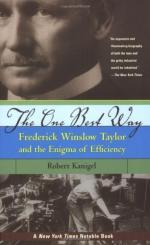|
This section contains 3,281 words (approx. 11 pages at 300 words per page) |

|
SOURCE: "The Coming Rediscovery of Scientific Management," in Toward the Next Economics and Other Essays, Harper & Row, Publishers, 1981, pp. 96-106.
In the following essay, originally published in The Conference Board Record in 1976, Drucker advocates the application of Taylor's principles to what Drucker calls "knowledge work. "
Everybody "knows" the following "facts" about Frederick Winslow Taylor: His aim was "efficiency," which meant reducing costs and increasing profits. He believed that workers responded primarily to economic incentives. He invented the "speed-up" and the assembly line. He saw only the individual worker, and not the work group. He considered workers to be "machines" and to be used as machines. He wanted to put all power and control into the hands of management, while he had deep contempt for the workingman. And he was the father of "classical organization theory," with its hierarchical pyramids, its concept of the span of control, its functions...
|
This section contains 3,281 words (approx. 11 pages at 300 words per page) |

|


